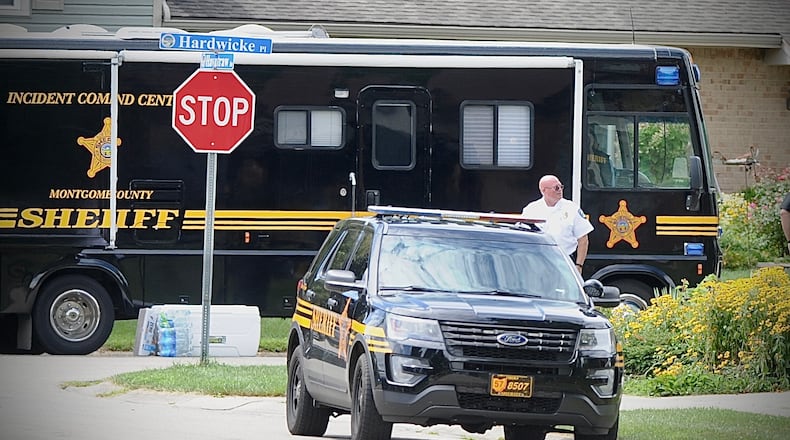“Her opinion was that Marlow was currently capable of understanding the nature and objective of the proceedings, but was currently incapable of assisting an attorney in his defense, and was therefore incompetent to stand trial and unrestorable within the time allotted by law,” he said.
Credit: Marshall Gorby
Credit: Marshall Gorby
Marlow is pleading not guilty by reason of insanity to 12 aggravated murder charges, eight aggravated burglary charges and one count each of tampering with evidence and having weapons while under disability in the deaths of Clyde W. Knox, 82; his wife, Eva “Sally” Knox, 78; Sarah J. Anderson, 41; and her daughter, Kayla E. Anderson, 15.
Marlow reportedly walked into an open garage around 11:35 a.m. Aug. 5, 2022, at 7120 Hardwicke Place and shot Sarah Anderson before going into the house and shooting Kayla Anderson multiple times. He then returned to the garage and shot Sarah Anderson again, according to a Vandalia Municipal Court affidavit.
Marlow then went to 7214 Hardwicke Place and shot Clyde and Sally Knox multiple times in their garage, according to court documents. Marlow fled but was arrested the next day in Lawrence, Kansas.
Credit: Montgomery County Jail
Credit: Montgomery County Jail
Investigators found a manifesto on what was reported to be Marlow’s computer after they served a search warrant at the house on Haverstraw Avenue, where Marlow lived with his parents.
The manifesto, which included his name and address, mentioned conspiracy theories and beliefs his neighbors were sleeper cell terrorists, according to Vandalia Municipal Court records. He also reportedly mentioned hearing voices in his head that spoke to him.
Marlow rented a storage unit on Dixie Drive to keep firearms and hide them from his mother, according to court records.
Prosecutor Mat Heck Jr. said when announcing the indictment against Marlow that the death penalty is “on the table.” However, an Ohio law enacted in 2021 exempts people who have a serious mental illness from capital punishment.
Montgomery County Common Pleas Judge Dennis Adkins on Wednesday overruled the prosecution’s request for a seventh forensic evaluation, noting “the court has a hearing Dec. 20 regarding the findings in Sutton’s report.” At that time both sides will have the opportunity to cross-examine Sutton and present evidence, the judge said.
In question is when Marlow’s one-year treatment window expires, in part because he was not admitted to Summit until January and because Marlow has refused to fully participate in his treatment regimen, prosecutors wrote in a Wednesday filing.
The court’s order requiring Marlow to be treated at Summit for competency restoration was filed Nov. 29, 2023. However, he was not admitted to Summit until Jan. 17, 2024. This is why the prosecution claims Marlow’s time for restoration will not expire until Jan. 17, 2025, at the earliest.
Further, prosecutors say Marlow has not fully participated in his treatment and the time to restore should be tolled until he does fully participate in treatment for one year because he has refused education on his medication, individual psychotherapy and competency restoration groups, among others, that were recommended by this treatment team, because he believed they were not necessary or he was “not interested.” They wrote Marlow in July twice refused to meet with his treatment team and refused at least one meeting with his psychiatrist.
“Defendant has not undergone one year of treatment because he refuses to participate. Defendant appears to be satisfied biding his time at Summit, refusing to address the issues that led him to be incompetent while the families of the four individuals he executed suffer as they wait for justice and closure for defendant’s actions.
“It is unknown whether full participation in the recommended treatment would restore defendant to competency, but what is clear is that defendant has not participated in the services available to him. Until he does so for a period of one year, the state asserts that the one-year period can be ordered by this court to undergo treatment has not expired,” the prosecution wrote.
If Adkins rules Marlow’s time for restoration has expired, the prosecution asked for the court to retain jurisdiction over Marlow and to hold a hearing to determine “by clear and convincing evidence” whether Marlow committed the offenses charged.
If Marlow is determined to have committed the offenses as charged, the court must consider the extent to which he is a danger to others, the need for security and type of crime to order the least restrictive alternative available, according to Ohio Revised Code. In her report, Sutton recommended Summit if the court retains jurisdiction, court records show.
Credit: Jim Noelker
Credit: Jim Noelker
About the Author





